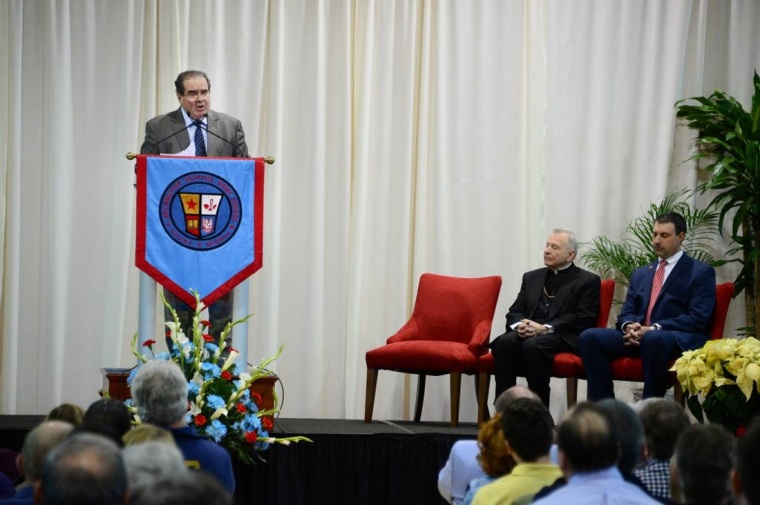Justice Scalia: Government was never meant to be neutral on religion

METAIRIE, Louisiana (Christian Examiner) – U.S. Supreme Court Justice Antonin Scalia, known as the conservative firebrand on the nation's high court, said during an address to Catholic high school students in Louisiana Jan. 2 that the U.S. Constitution does not require the government to be neutral with respect to religion.
In fact, Scalia told the audience at Archbishop Rummel High School as part of an early celebration of Religious Freedom Day (Jan. 16), the government would do well to keep God in the mix and allow times for spiritual reflection because "God has been very good to us."
Religious Freedom Day is celebrated annually by presidential proclamation and commemorates the passage of the Virginia Statute for Religious Liberty in 1786, widely regarded as the precursor to the First Amendment.
Scalia said the modern perception that government was meant to be neutral to religion is not the groundwork for the Constitution, as evidence by the fact that so many presidents and other American leaders invoked the name of God and asked Americans to pray to him in times of national crises.
"To tell you the truth there is no place for that in our constitutional tradition. Where did that come from?" Scalia asked. "To be sure, you can't favor one denomination over another but can't favor religion over non-religion?"
That we won the revolution was extraordinary. The Battle of Midway was extraordinary. I think one of the reasons God has been good to us is that we have done him honor. Unlike the other countries of the world that do not even invoke his name we do him honor. In presidential addresses, in Thanksgiving proclamations and in many other ways.
Scalia recalled that he was in Rome when news of the terror attacks of Sept. 11, 2001, broke and said he was pleased to hear President George W. Bush invoke the name of God and ask for his blessings. Bush had done what many other presidents and leaders had done, he said.
"That we won the revolution was extraordinary. The Battle of Midway was extraordinary. I think one of the reasons God has been good to us is that we have done him honor. Unlike the other countries of the world that do not even invoke his name we do him honor. In presidential addresses, in Thanksgiving proclamations and in many other ways," Scalia said.
"There is nothing wrong with that and do not let anybody tell you that there is anything wrong with that," Scalia said.
Scalia, appointed to the court in 1986 by President Ronald Reagan, has been on the court longer than the other eight justices – five of whom do not share his conservative views. That is a fact Scalia knows, and he said he is aware the other justices will disagree with his views on religion and see the Constitution in a way it was never meant to be interpreted – as viewing religion and non-religion as equals.
Scalia said he would honor that notion only if the Congress enacted it by statute. Until then, he said, "don't cram it down the throats of an American people that have always honored God."
Scalia's critics will likely latch on to his words and take him to task for them.
One critic, Jeff Schweitzer, a former Clinton White House senior policy adviser, has already written at Huffington Post that Scalia had taken leave of his senses. He called the justice, who calls himself a "textualist" interpreter of the Constitution, or one who attempts to see things as the Founding Fathers did, a "spiritualist" who attempts to channel "the minds of Jefferson and Adams; really how else would he have any greater insight into the meaning of those words than any other legal scholar?"
Schweitzer called Scalia "the Carnac of the Supreme Court. Only Scalia knows what the founders really meant; only he can interpret the words accurately, even though he apparently has trouble interpreting his own."